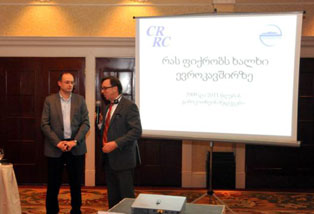Nino Kharadze, Radio “Liberty”
On January 16, the Eurasian Partnership Foundation presented the report of the research “Knowledge and Attitudes towards the EU in Georgia”.
The Eurasian Partnership Foundation’s program, “Caucasus Research Resource Center,” (CRRC) conducted the first survey on the topic in 2009 and then in July of 2011. The report reveals the attitude of the Georgian population towards the EU and what has changed in their attitude from 2009 to 2011. What do Georgian people know about the EU and what does the society expect from the EU membership?
12% of the interviewed people think Georgia is member of the EU; their number was 2% less in 2009. It is the result of the survey carried out by the Eurasian Partnership Foundation’s program CRRC which is reflected in the report: Knowledge and Attitudes towards the EU in Georgia. The survey was conducted in two stages – in 2009 and in 2011. Initially about 1600 and then about 1900 respondents were interviewed throughout Georgia.
The CRRC director Koba Turmanidze stated during the report presentation that the local population has some information about the EU without sufficient knowledge though 80% of the interviewed people are ready to vote for the EU membership. 38% of them think Georgia might join the EU in five years or even earlier. Koba Turmanidze wonders what the attitude of the local population would be like if they had more information about it.
“It is important to know whether Georgian citizens still wish to join the EU after each of them acknowledges the benefits and values of it. Nowadays, it is only their kind will and not a reasonable choice. So, more information will assist everybody in making a reasonable decision – whether EU membership is really good or it has some negative consequences too,” said Koba Turmanidze.
Oliver Reisner, project manager at the Delegation of the EU to Georgia, is not surprised that not many people in Georgia have real knowledge about the EU. He said even citizens of EU member states do not often have an idea about the EU and its institutions. “The EU is a curious thing even for the EU citizens. They do not know difference between the European Commission and the Council of Europe either. Those institutions are very strange for many people, for ordinary citizens. I hope, the purpose and significance of the EU will be better taught and explained in schools, through various programs and in the media.”
Oliver Reisner thinks people will learn more about the EU through public discussions and media because it is not only the part of the government’s external policy; it will reflect on the domestic life of every person because the EU has some requirements for Georgia.
The authors of the research wondered which sources Georgian citizens used to get information about the EU. The research showed their main source of information was television and 25% of the interviewees named it. However, program manager at the Eurasian Partnership Foundation Vakhtang Kobaladze said the provided information lacks analysis. “The media insufficiently covers the issues related to the European integration. What they release on TV is only superficial information about visits and signed agreements; so it is just a description. Analytical discussion is not enough.”
Almost half of the interviewees wish to know more about the EU. 37% of them think Georgia will soon join the EU; but 34% thinks Georgia shall join NATO first.
Radio “Liberty” interviewed several people in the streets – asking whether they supported the idea of Georgia’s membership in the EU and why?
“Georgia is a European state and it will be better if we have more links with the Europe.”
“We are European people and we also want to live in prosperity like they live in Europe; and I will be happy if we join the EU.”
“European states will assist Georgia more than Asian states. Georgia should become a member of the EU because we really have democracy in our country and not socialism. It is very significant.”
“If it assists Georgia in anything, let us join the EU. But, I still think only God can save Georgia only if we move up.”
This survey proves the author’s conclusion that Georgian people are devoted lovers of Europe and a majority of them wish to join the EU.




